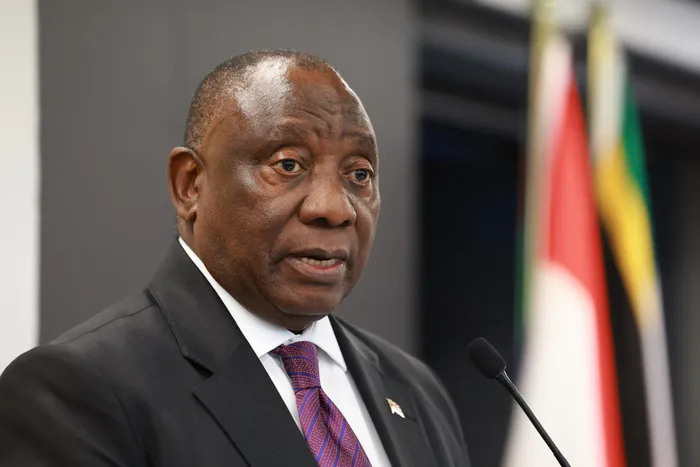
President Cyril Ramaphosa has announced a new judicial commission to investigate deep-rooted dysfunction within the police. Will this inquiry finally uncover the truth and lead to meaningful change?
Image: GCIS
When President Cyril Ramaphosa announced yet another judicial commission this time to investigate deep-rooted dysfunction within the police the question wasn't whether the truth would emerge. It was whether anything would change.
We've been here before.
The Zondo Commission laid bare the full extent of state capture, naming names, exposing networks, and recommending sweeping reforms. Yet years later, South Africans are still asking: How far have we come in implementing those recommendations? Why are so many still waiting for justice, restitution, or real reform?
Now, following bombshell revelations by KwaZulu-Natal Police Commissioner Lieutenant General Nhlanhla Mkhwanazi who courageously exposed rot, political interference, and operational decay at SAPS's heart we're again placing hope in a judicial commission. But hard questions demand answers.
Will this be another toothless inquiry, destined to produce a glossy report and little else? Will Mkhwanazi be supported or scapegoated? Will the public be engaged or merely placated?
Most importantly: What will make this commission succeed where so many have failed?
Judicial commissions have become our default crisis response. From ethics violations to public trust deficits, policymakers reflexively turn to them as proof of action. Yet government shelves already groan under dust covered reports that achieved little beyond symbolism.
The issue isn't whether we need judicial commissions, whether we'll finally design ones built to deliver results rather than rhetoric.
The first fatal flaw plaguing most commissions is what I call the accountability paradox: they're granted impressive investigative powers but no enforcement muscle. They excel at exposing problems less so at fixing them.
Truly effective commissions transcend "fact-finding" missions to wield binding powers that compel reform. South Africa's own Judicial Service Commission, established in 1994, exemplifies this approach. Beyond overseeing judicial appointments, it enforces ethical conduct through transparent processes public interviews, inclusive representation that helped rebuild trust in our post-apartheid judiciary.
Contrast this with advisory only commissions, which quickly become political footballs: praised by supporters, dismissed by opponents, and ultimately relegated to ceremonial irrelevance.
Political independence isn't a luxury it's an existential requirement. Across the globe, commissioners have been dismissed or marginalized when their findings threatened powerful interests. South Africa cannot afford this pattern.
Genuine independence demands three non-negotiables:
Too many commissions operate behind coverings of secrecy, undermining the very trust they aim to rebuild. In our digital age, opacity isn't just outdated, it's counterproductive to reform goals.
Successful commissions embrace radical transparency through:
This transparency doesn't compromise integrity, strengthens legitimacy by demonstrating accountability in action.
Even visionary recommendations prove worthless without robust follow-through. Reform graveyards overflow with brilliant ideas that never escaped paper.
To avoid this fate, effective commissions must:
Judicial commissions don't operate in political vacuums. Effective reform requires understanding of the political ecosystem, not surrendering to it.
Strategic considerations include:
Evidence shows that transformative judicial commissions share critical characteristics distinguishing them from failed counterparts:
They possess clear mandates with measurable objectives rather than aspirational vagueness. They maintain operational independence through structural protections, not ceremonial declarations. They embrace transparency as a strategy, not liability. They design enforcement mechanisms from the outset rather than hoping for voluntary compliance.
Most crucially, they understand that judicial reform ultimately concerns public trust. In an era of declining institutional confidence, commissions that enhance rather than undermine faith in courts serve democracy's fundamental needs.
South Africa doesn't lack judicial reform ideas. What's missing is the resolve to implement what experience teaches works.
Lieutenant General Mkhwanazi's revelations present both crisis and opportunity. His courage in exposing institutional decay deserves support, not scapegoating. The commission investigating his allegations must be structured for success, not designed for bureaucratic theater.
This moment demands more than good intentions. It requires structural clarity, political courage, and unwavering commitment to transparency and public interest. The blueprint for commission success exists, drawn from both our own experience and the best international practices.
The only remaining question is whether we possess wisdom and the will to follow it.
The stakes couldn't be higher. Public trust in our institutions hangs in the balance. We can continue the cycle of well-intentioned commissions producing impressive reports that gather dust, or we can finally build one designed to deliver the accountability and reform our democracy desperately democracy.
Nyaniso Qwesha
Related Topics: